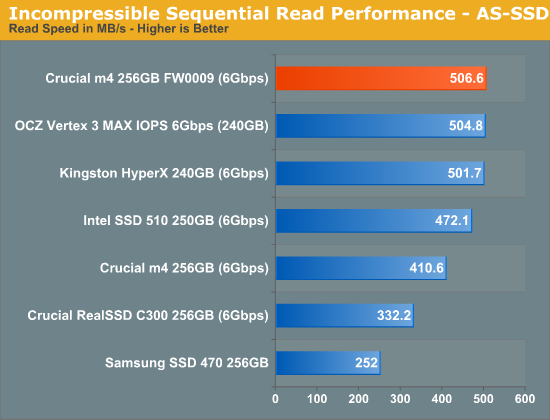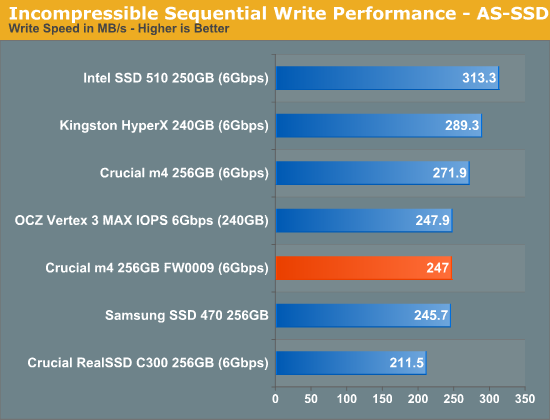The Crucial m4 SSD Update: Faster with FW0009
by Anand Lal Shimpi on August 31, 2011 12:56 AM ESTAS-SSD Incompressible Sequential Performance
The AS-SSD sequential benchmark uses incompressible data for all of its transfers. The result is a pretty big reduction in sequential write speed on SandForce based controllers.

AS-SSD tends to post higher numbers than our Iometer sequential tests, and here we see Crucial break the 500MB/s barrier in read performance with the FW0009 update.

Write speed under AS-SSD actually fell a bit, the older firmware was 10% faster here.










45 Comments
View All Comments
Nakecat - Wednesday, August 31, 2011 - link
so if TRIM won't work in RAID, it's still ok to run in RAID with ssd built-in GC?I have 4 C300 256GB and thinking either going for RAID 0 or RAID 5.
jwilliams4200 - Wednesday, August 31, 2011 - link
It is NOT true that the Sandforce GC is notably better than the Crucial/Marvell GC.Anand has a terrible method of trying to measure the GC effectiveness. Running HD Tach is just an absurd way to look at how GC performs under realistic work loads. It is almost impossible to name a realistic workload that does large sequential writes OF A STREAM OF ZEROS across the entire span of the SSD. The Sandforce drives just compress the stream of zeros by a factor of about 10, and therefore need to write only about 10% as much data to flash as the Crucial/Marvell, thus making it look like the performance with Sandforce does not degrade much. But if you wrote the same workload to the SSD with incompressible data, the Sandforce GC performs similarly to the Crucial/Marvell GC.
This problem with Anand's testing has been pointed out to him before, but he continues to print misleading information.
Anyone who is interested in looking at sustained performance of SSDs without TRIM should look at the industry standard test protocols as defined in the SNIA documents for "Solid State Storage (SSS) Performance Test Specification (PTS)"
http://www.snia.org/tech_activities/standards/curr...
In particular, the is a pre-conditioning test that specifies using random data and 4KB random writes to get the drive into a steady-state condition. By measuring IOPS vs time while doing 4KB random writes, it is possible to observe the degradation in performance. Then after the drive reaches steady-state, more extensive tests are run to determine sustained performance. This is the sort of testing that Anand should be doing.
MarcHFR - Thursday, September 1, 2011 - link
I agree that using HD Tach is not a very good for such a thing on SandForce SSD.You can also note that HD Tach doesn't wrote so much data on the drive, even a "long" run is ratter quick.
Using IOMETER with incompressible data i get a onther story :
http://www.behardware.com/articles/830-13/tenue-pe...
aferox - Wednesday, August 31, 2011 - link
I've been running two C300 drives for about a year, and an m4 for about two months. Absolutely no problems in that time. Given that these drives were substantially (!) cheaper than the alternatives, and available in large capacities (total of 1TB) I've got to consider them excellent purchases. I'm definitely willing to give up a little speed for reliable and less expensive drives.danjw - Wednesday, August 31, 2011 - link
Why do you let us know that the some of the others are attached to a 6Gbps port, but not some. This chart and review are not useful, unless you provide that data. This seems like a no brainier. Are you purposely handicapping the drives that aren't attached to 6Gbps ports? What is the motivation for this?MrSpadge - Wednesday, August 31, 2011 - link
Considering it's called "Vertex 3 MAX IOPS 6Gbps (240GB)" it looks like a simply typo and was meant to be "Vertex 3 MAX IOPS 240GB (6Gbps)"... which is supported by the fact that the Vertex 3 pushes > 500 MB/s in the article, which would be impossible using SATA-2. The Samsung doesn't support SATA-3. Chill, mate.LTG - Wednesday, August 31, 2011 - link
On OSX (Mac) how much of a performance penalty do we pay over time for not having trim?You mentioned this may be an issue in a previous article...
LTG - Wednesday, August 31, 2011 - link
Ugh, sorry I saw you addressed that - thanks.ChristophWeber - Wednesday, August 31, 2011 - link
On my Intel X25M G2 practically none. There is a TRIM enabler tool for MacOSX floating around, ask Google.gramboh - Wednesday, August 31, 2011 - link
The 256gb M4 is still $439.99 at my local retailer/etailer, and $399.99 at newegg.ca - hopefully the price comes down a bit to match what it is going for in the U.S., because it is an excellent value compared to the 510 at those prices.